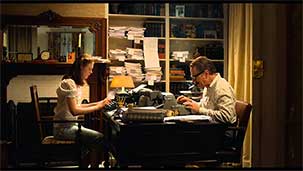Combing through a script to verify historically accuracy, pointing out legal conflicts and continuity errors, making suggestions for alternatives—you don’t have an easy job, Malcolm. Even under the simplest of circumstances. And with Trumbo, you were given a script about one of the darkest moments in Hollywood’s history: the jailing and blacklisting of screenwriters accused of Communism in post-WWII America.
So, you know—no pressure.
I can imagine your conundrum. You have a real-life story that takes place during a time of great cultural and political change, colourful characters and toothsome subject matter, but the script itself is jokey, plodding, and decidedly small-screen in its scope. Do you speak up? Or do you just keep mum to stay employed? The real crime here is that this period of history – so bleakly fascinating, and featuring the most famous of all blacklisted writers - is given such humdrum treatment.
Dalton Trumbo was already living comfortably as one of the most famous scribes in Hollywood when his support of striking film workers singled him out as an agitator. With the threat of the Red Menace reaching panic levels, U.S. Congress called a hearing to determine which writers in Hollywood were Communists. Trumbo and nine others, dubbed the Hollywood 10, were held in contempt and jailed for their political beliefs. Once released, Trumbo continued writing under pseudonyms, employing his family as a scriptwriting sweat-shop to get his work out. When word leaked that Trumbo had, by proxy, written Oscar-winners Roman Holiday and The Brave One, it became difficult to keep Hollywood heavyweights like Kirk Douglas (Spartacus) and Otto Preminger (Exodus) away. Trumbo was determined to get his name back on the credits and off of the blacklist.
But the film Trumbo is nothing more than proof that we have reached “peak biopic”. It’s full of big name actors – Bryan Cranston as Trumbo, Helen Mirren as gossip-columnist Hedda Hopper, Diane Lane as Cleo Trumbo – all playing one-dimensional characters who meander through a by-the-numbers story intent on showing audiences just how far we’ve come. In your research you must have found so many interesting sub-plots and lesser-known players that could have given this film a little more depth. Instead, it strives so much to be an Important _Film that, much like the House Un-American Activities Committee, it becomes a victim of its own hubris.
The stuff the script gets right, like Trumbo’s huge personality and self-righteousness, are well-served by an actor like Bryan Cranston. It’s clear that his mugging on Malcolm in the Middle prepared him to chew some period-appropriate scenery. Director Jay Roach, better known for helming Austin Powers and Meet the Parents, doesn’t seem to know whether he’s making a comedy or a drama, and both elements suffer. His mis-casting of Louis CK as a doomed member of the Hollywood 10 proves this point. It seems like CK was given free rein to re-write his own dialogue. I feel for you, Malcolm; keeping up with his anachronisms must have given you writer’s cramp.
CK’s character is a composite, which in itself must have been a head-scratcher for you, considering the wealth of fascinating real-life writers screenwriter John McNamara could have brought to life (Ring Lardner Jr. and Adrian Scott, to name just two). Or maybe you tried and failed to get clearance from the families who wanted nothing to do with this trifle.
The real heart of the story is supposed to be Trumbo’s difficult relationship with his family, who must suffer his verbal abuse while he writes in the tub, high on Bennies. But the more interesting relationship is the one he has with actor Edward G. Robinson, who sold out others to save his career. Michael Stuhlbarg looks nothing like Robinson, but he and Cranston generate the film’s most honest moments. One is a man who refuses to give up his ideals, the other is a man torn between doing what’s right and doing what’s best for him, and they’re both trying to stay alive in the cutthroat world of the Hollywood film industry.
It’s a shame that a movie about one of the greatest screenwriters who ever lived is so uninspired. A story like this deserves more gravitas, fewer guffaws. Instead of telling a serious story and injecting it with humour, we got a lot of slap-happy hijinks and over-the top moralizing. I’m not sure who exactly on this film should be held responsible for turning in such a mess, but I don’t expect you to name names. You’ve been through enough.
Best,
Di







